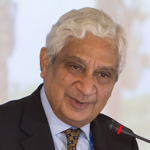Blog
Reform the UN and the Bretton Woods Institutions
by Deepak Nayyar
The United Nations, the World Bank and the International Monetary Fund, created at the end of the Second World War, today operate on outdated political and economic foundations. They need to be overhauled before a crisis induced by globalization forces the changes required. The UN and its security council together with the Bretton Woods Institutions (BWIs) need urgent reform to meet globalization’s challenges.
It took a world war and a worldwide economic depression to create the UN and the BWIs. Fifty years on the international community should not wait for a crisis of such proportions to take action on global governance.
Its Time to Reform the Reformers
The BWIs are the most ardent advocates of economic reform. It is now time to reform the reformers. Both institutions were created to manage the international payments system and to help Europe reconstruct. This was at a time shaped by memories of the Great Depression.
But the world has changed since then. BWI orthodoxy has not resolved the economic problems of borrowing countries: deep poverty and inequality persist. And the BWIs are incapable of effectively managing today’s international financial system—in particular the instability and volatility of exchange rates and capital flows. The essence of the problem is international capital flows without any international controls. In fact, globalization has accentuated the crisis of development.
The IMF must manage and stabilize the international financial system, not only through crisis management but also through more crisis prevention. It is high time the IMF practices what it preaches about transparency. Accountability is an imperative without which the Fund will continue to pursue the interests of a subset of the international community—often to the detriment of the general interest of peoples and governments or the collective interest of the world economy.
The World Bank should cease to be a moneylender and transform itself into an institution more concerned with development, focused on development activities in poor countries. Accountability at the World Bank is limited to finance ministries and central banks. An independent evaluation of Banksupported projects and programmes should be a first step to improving its accountability to governments and peoples.
The number of humanitarian crises with their legacy of death, displacement, and destruction, has risen dramatically over the past decade. The response of the international community and of the UN—in peace-keeping, helping refugees, mine clearance, reconstruction etc—has been ad hoc, inadequate or simply not forthcoming. There is still no system in place to take care of—let alone prevent—complex humanitarian emergencies. Action is urgently required (see Box).
Missing Institutions
International capital markets have undergone explosive growth since 1944. A new financial architecture is needed to manage global macroeconomics and prevent crises. What are the foundations for a new system of macroeconomic management?
The cornerstones must be institutional mechanisms to foster consultation, consistency, and surveillance of national macroeconomic policies. This must be supported by more emergency finance, available before (not after) international reserves are depleted in times of crisis. Standstill procedures, or orderly debt workout procedures, must be initiated to deal with country debt problems, in the same way that these procedures handle private-sector bankruptcy procedures. And countries need more support in developing minimum standards in prudential regulation, supervision, and accounting.
Governing Transnational Corporations
An international system of governance for transnational corporations is also needed. This should focus not only on the rights—but also the obligations—of transnational corporations. Restrictive business practices should be curtailed, and an international regime of anti-trust laws created. This can build on efforts by the UN Conference on Trade and Development, the experience of the EU, and initiatives by the OECD and the IFC.
Globalization has reduced the power of national governments in economics and politics without a corresponding increase in effective international co-operation or supra-national government which could regulate this market driven process. Without effective international oversight, international problems (such as international crime, or trade in drugs, guns, people, and human organs) will increase while international public goods (world peace and sustainable development) will be undermined.
An international mechanism for co-operation between nation states which facilitates co-ordinated action and co-operative behaviour is needed. Above all, it is essential to create institutional mechanisms that give poor countries and their people a voice in the process of global governance.
Professor Deepak Nayyar is Vice-Chancellor of Delhi University, a member of the WIDER Board, and director of the WIDER project on ‘New Roles and Functions for the UN and the Bretton Woods Institutions’. This article is based on Professor Nayyar’s public lecture ‘The Governance of Globalization’ on 18 June 2001 at WIDER in Helsinki. Research papers from this project are available through the Institute’s Web site at www.wider.unu.edu
 Join the network
Join the network